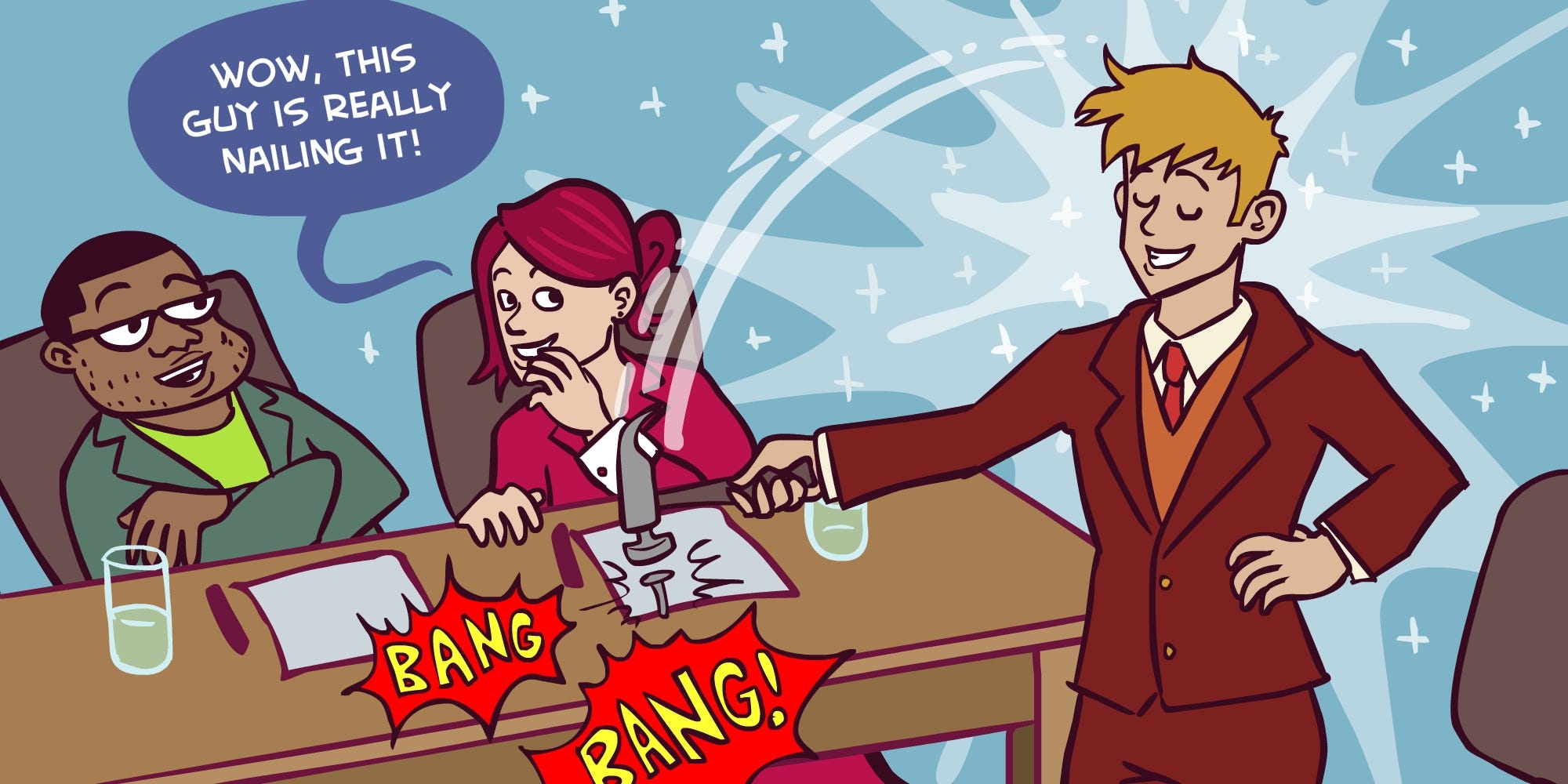
There are a lot of articles out there about how to do well in an interview. Yes, we all know you should have a firm handshake, and prepare for the “what’s your greatest weakness” kind of questions, and be nice to the receptionist. This is not that article.
Here is your checklist for really nailing that first job interview.
1. Research the company
Research the damn company! It’s crazy how many people just do some cursory research and head off to the interview. You should know the company as well as an outsider could possibly know it. Know about their business model, funding, growth, the product(s), target audience, history, future, trends in the space, competitors, team and culture. Make sure to read their blog and any personal blogs of the people interviewing you.
Not only will this be helpful for answering their questions (duh), but it’ll give you more confidence going in and facing the dreaded question “So, why do you want to work for us?” If you understand where they’ve been and where they’re going, you can insert yourself right in there and give them a killer answer.
2. Research the people
Of course you should do the standard research on LinkedIn and Twitter, but there’s something else people rarely mention. You need to go deeper and look holistically at the person and what they are trying to get out of the interview. If you can see it through their eyes, you can prepare the right answers to all of their questions. Think about:
- What they value;
- Their responsibilities and priorities;
- What they’re afraid of. For example, a founder is afraid of making the wrong choice and wasting money or damaging the culture. A peer is afraid that you might not get along. A manager is afraid that you won’t actually take work off their plate;
- What they’re trying to accomplish in their role;
Once you know these things, you can think about what questions they are going to ask. And you will know how to tweak your “pitch” to fit the person you’re talking to.
Don’t forget to do a bit of personal research as well and see if you have any friends or hobbies in common. Once I had an call with the founder of a music startup. He told me he did his masters in London, but mentioned he spent most of his time there immersed in the music scene. Electronic music is totally my thing, so for the next fifteen minutes we geeked out about music. He asked me to come in for an interview, and when I got there it was like we were already friends. It was an extremely pleasant interview.
3. Tell your story
Ah, stories rule the world. Or so they keep telling us. No, but really. I’m sure you’ve heard all of the research, so I won’t bore you. The point is, the story you tell in your interview is the linchpin for getting the job. It’s how you weave all of the different aspects of yourself into one cohesive narrative that says “I’m perfect for this job, now gimme” (maybe a bit less aggressively).
You can figure out your story by focusing on three messages about yourself that you want to convey. These can be values, attributes, or skills, and should absolutely be tied to what they are looking for in an employee. Break down the job description and everything you know about the company and determine what they want to see from you and how that ties to your strengths.
Once you have these three things, figure out a story for each of them. Show the connection between what you have achieved and what they need. Whenever possible, use one of your stories to answer their questions. Take a cue from politicians. No matter what question they are asked, they quickly bring it back to their “stump speech,” the only things they actually want to talk about.
Do this. If you have your stories down, you’ll be able to control the narrative, their impression of you, and, most importantly, the interview.
4. Ask the tough questions
That’s really the key to all of this — taking control of the interview. You’re interviewing them as much as they are you. People always say that, but it’s true. And if you act that way, you’ll flip the tables and end up controlling the interview, which is exactly where you should be. You don’t want to waste your time on a crappy company/team/product, and it’s best to find out right away.
Here are, in my opinion, the best questions to ask at certain points in the interview.
Beginning:
What are your biggest challenges right now? What are your goals this year? How will I contribute?
This question always gets a good response. It makes you look good, and the answers are helpful for framing your story.
Middle:
Specific questions about how they approach the department you’ll be in — how they make decisions, how the team is structured, the current strategy or process, and so on. This is different depending on the type of role you’re interviewing for. In tech interviews, you should generally ask stuff such as:
- What’s your technology stack?
- Are you worried with updating your technology?
- Are you using agile methodologies? Which ones?
- Do you have a training plan for employees?
Answers to these questions can be very illuminating. It shows both where they are as a company, but also how they think about this stuff, and most importantly, how they feel about it.
The way they answer that question reveals how much they know and how much they care. These questions will obviously be different if you’re looking for a different type of role. But take some time to think about what these questions would be for the role you’re interviewing for. It can save you a lot of time.
End:
At the end of the interview, you’ll want to ask about the next steps, but it’s also good to ask if there is anything they didn’t see that they’re looking for in this role. This can be awkward, but it’s helpful in making your case. Often, it’s a quality or skill you have, but it didn’t come across when talking to them.
And don’t forget to send a thank you email ASAP, preferably mentioning a few specifics from the interview. If you had more thoughts about a topic you discussed, throw them in there. If there is something of value you can offer (maybe an article or resource you referenced in the interview), you absolutely should do that. This makes you look smart.
Okay, now get out there and hammer nail that interview! And if you walk into a supply closet after your interview, refer to this article.






0 Comments